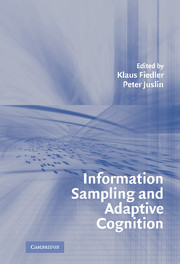Book contents
- Frontmatter
- Contents
- List of Contributors
- PART I INTRODUCTION
- PART II THE PSYCHOLOGICAL LAW OF LARGE NUMBERS
- PART III BIASED AND UNBIASED JUDGMENTS FROM BIASED SAMPLES
- PART IV WHAT INFORMATION CONTENTS ARE SAMPLED?
- 11 What's in a Sample? A Manual for Building Cognitive Theories
- 12 Assessing Evidential Support in Uncertain Environments
- 13 Information Sampling in Group Decision Making: Sampling Biases and Their Consequences
- 14 Confidence in Aggregation of Opinions from Multiple Sources
- 15 Self as Sample
- PART V VICISSITUDES OF SAMPLING IN THE RESEARCHER'S MIND AND METHOD
- Index
- References
13 - Information Sampling in Group Decision Making: Sampling Biases and Their Consequences
Published online by Cambridge University Press: 02 February 2010
- Frontmatter
- Contents
- List of Contributors
- PART I INTRODUCTION
- PART II THE PSYCHOLOGICAL LAW OF LARGE NUMBERS
- PART III BIASED AND UNBIASED JUDGMENTS FROM BIASED SAMPLES
- PART IV WHAT INFORMATION CONTENTS ARE SAMPLED?
- 11 What's in a Sample? A Manual for Building Cognitive Theories
- 12 Assessing Evidential Support in Uncertain Environments
- 13 Information Sampling in Group Decision Making: Sampling Biases and Their Consequences
- 14 Confidence in Aggregation of Opinions from Multiple Sources
- 15 Self as Sample
- PART V VICISSITUDES OF SAMPLING IN THE RESEARCHER'S MIND AND METHOD
- Index
- References
Summary
Groups often have to choose among several decision alternatives. For example, selection committees have to decide which of numerous applicants to hire, jury members have to decide whether the accused is guilty or not, medical decision-making teams have to recommend one of several possible treatments, and executive boards have to choose among different policy options. Such group decisions are normally preceded by a discussion of the merits of each decision alternative. This discussion can be understood as a process of information sampling: To prepare the final judgment or decision, the group samples information from their members' diverse information pools.
At this point, two of the core ideas underlying the whole book come into play. One of these is that information sampling is, in general, not a random process; rather, it is subject to systematic asymmetries originating from environmental or psychological constraints. The same is true for group discussions. In this chapter, we will deal with those two asymmetries that – in our view – are most characteristic and most specific for group information sampling, namely, the tendency to focus on so-called shared information (i.e., information known by all members prior to the discussion) and the tendency to predominantly discuss so-called preference-consistent information (i.e., information supporting the group members' individual decision preferences).
The second core idea of the book coming into play is that biased judgments need not necessarily reflect distorted cognitive processes but might rather be a consequence of biased sampling.
- Type
- Chapter
- Information
- Information Sampling and Adaptive Cognition , pp. 299 - 326Publisher: Cambridge University PressPrint publication year: 2005
References
- 4
- Cited by



